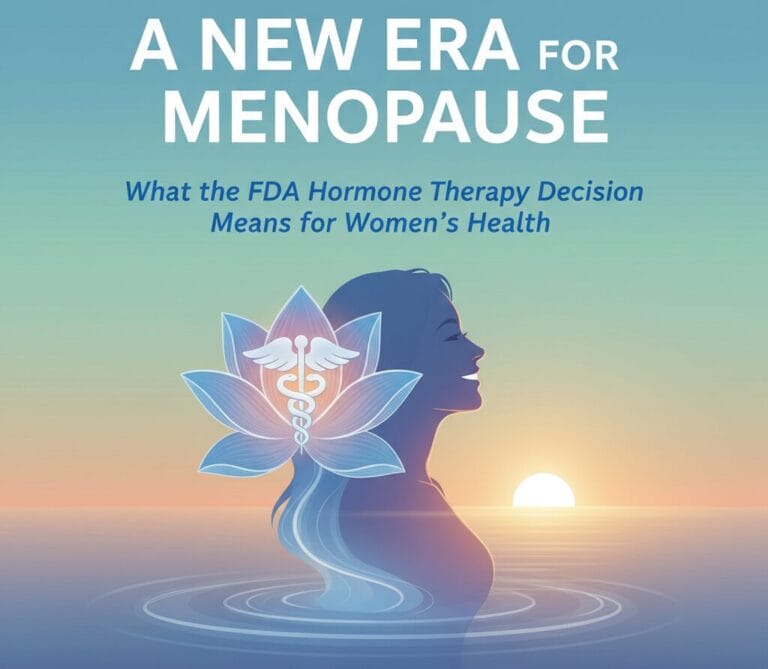
A New Era for Menopause: What the FDA Hormone Therapy Decision Means for Women’s Health
A Landmark Moment in Women’s Health
This week marks a powerful step forward in women’s health. The Food and Drug Administration announced the removal of the black box warning from hormone therapy used to treat menopause symptoms. For more than twenty years, this label created fear and confusion for women and healthcare providers.
When the warning was first introduced in 2003, it linked hormone therapy to an increased risk of breast cancer, stroke, and heart disease. Decades of follow-up research have now shown that the data was misinterpreted and that hormone therapy can be safe and beneficial when used appropriately.
Why This Change Matters
The FDA’s decision allows more open, informed conversations about hormone therapy. The only warning that remains applies to the risk of endometrial cancer from estrogen alone.
Current research shows that when hormone therapy begins near the onset of menopause, it can safely and effectively reduce symptoms such as hot flashes, sleep disruption, low libido, mood changes, and other genitourinary symptoms.. This shift not only removes unnecessary fear but also validates the science and advocacy that have long supported women’s right to informed care.
The Long History of Fear and Silence

For too long, women were told to simply “push through” menopause. Many providers avoided prescribing hormones altogether. This created years of unnecessary suffering and reinforced the idea that menopause was a decline rather than a natural and powerful life transition.
The removal of this warning is more than a policy change. It is a moment of healing. It reflects a new era where women’s health, pleasure, and quality of life are finally being taken seriously.
My Journey in Menopause and Sexual Wellness
My career began with a simple mission: to bring sexual wellness into the heart of women’s healthcare. Early on, I remember speaking on panels about menopause and reminding women that this stage of life can be full of pleasure, confidence, and connection.
One of my earliest collaborations was with Dr. Debra Wickman, a menopause specialist whose work changed how I viewed women’s health. She was one of the first professionals I worked with who insisted that menopause and sexuality be addressed together. I later had the honor of working with Dr. Mary Jane Minkin, whose advocacy helped break the shame that prevents so many women from even talking to their doctors about menopause.
I have worked with women recovering from cancer, those navigating medical menopause, and others living with endometriosis. Too many of them were never given accurate information that could have eased years of pain and confusion. Through this work, I’ve seen how education and compassion can transform suffering into empowerment.
In my private practice, I support women one-on-one as they rebuild confidence, reconnect to their bodies, and advocate for their health. We talk about everything from hormone therapy and emotional regulation to relationship changes and self-worth. Menopause often challenges identity, but it can also awaken a deeper sense of self.
Rewriting the Narrative
The conversation about menopause is evolving. More clinicians, educators, and brands are coming together to promote empowerment instead of fear. Through my collaborations with companies such as Versalie, I continue to teach that menopause is not an ending but a transformation. It is an opportunity to rediscover your energy, your sensuality, and your sense of purpose.
(Read my full menopause story and partnership with Versalie).
Moving Forward Together
This change from the FDA is a major victory, but progress continues. Access to care, education, and individualized treatment remain essential. True menopause support includes:
- Clear, compassionate conversations about treatment options
- A focus on sexual and emotional wellness
- Integrative support for nutrition, movement, and nervous system balance
- Continued advocacy to make menopause care inclusive and accessible
The menopause market is expected to grow significantly, reflecting a rising demand for better care and accurate information. This movement is not about marketing; it is about reclaiming power and dignity in women’s health.
Closing Thoughts
The FDA’s decision affirms what many of us in this field have known for years: women deserve facts, not fear. For me, this moment reinforces why I chose this path. I have dedicated my career to helping women navigate menopause with knowledge, confidence, and compassion.
We are entering a new era of awareness, one that celebrates the wisdom of midlife and the vitality that comes from understanding our bodies. Together, we can continue to change the story of menopause. Everyone’s voice counts.






